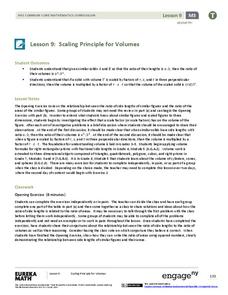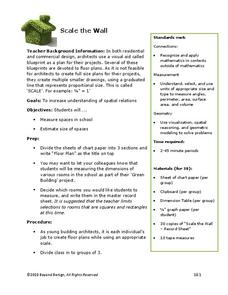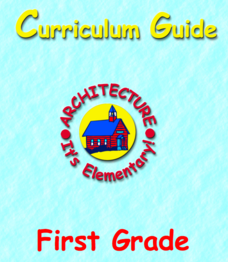EngageNY
Relating Scale Drawings to Ratios and Rates
Enlargements and reductions are all about scale. The instructional activity introduces scale drawing to the class. Pupils determine whether the drawing is a reduction or an enlargement, and the constant of proportionality between the...
EngageNY
Scaling Principle for Volumes
Review the principles of scaling areas and draws a comparison to scaling volumes with a third dimensional measurement. The exercises continue with what happens to the volume if the dimensions are not multiplied by the same...
EngageNY
Computing Actual Lengths from a Scale Drawing
Class members take scale drawings and examine scales to determine distances in the actual objects. Pupils convert the scales of different units to scale factors that can be used in proportional equations.
EngageNY
The Unit Rate as the Scale Factor
Discover the scale factor by finding the constant of proportionality. Pupils investigate drawings to determine whether the distances are proportional. The activity defines the scale factor as the constant of proportionality, or unit...
Brigham Young University
To-Scale Models
Guided by their analysis of a scene, their initial sketches, and renderings, set designers begin to craft a scaled, 3-D model of the set of the play they have chosen.
EngageNY
An Exercise in Changing Scales
Classmates create a scale drawing from another scale drawing, changing the scale in the process. Groups enlarge or reduce the scale of the drawing and discuss their processes.
Beyond Benign
Scale the Wall
How can you fit an entire school on one sheet of paper? You use scale! Scholars measure rooms in the school and, using the correct scale, design a floor plan that includes area calculations with their data.
EngageNY
Changing Scales
Pupils determine scale factors from one figure to another and the scale factor in the reverse direction. Scholars compute the percent changes between three figures.
EngageNY
Solving Area Problems Using Scale Drawings
Calculate the areas of scale drawings until a more efficient method emerges. Pupils find the relationship between the scale factor of a scale drawing and the scale of the areas. They determine the scale of the areas is the square of the...
EngageNY
Computing Actual Lengths from a Scale Drawing
The original drawing is eight units — how big is the scale drawing? Classmates determine the scale percent between a scale drawing and an object to calculate the length of a portion of the object. They use the percent equation to find...
EngageNY
An Exercise in Creating a Scale Drawing
Design your dream classroom. The lesson plan contains an exercise to have teams create a scale drawing of their dream classroom. Pairs take the measurements of their classroom and furniture and create a scale factor for them. To finish...
EngageNY
Computing Actual Areas from a Scale Drawing
Square the scale factor when working with scaled drawings and area. The 19th lesson in a series of 22 introduces calculating actual areas from scale drawings. The lesson encourages pupils to use the square of the scale factor to find the...
Curated OER
Scale Model of the Solar System
Young scientists gain a better understanding of space, the solar system and its vastness by creating a scale model. Students first need to calculate the distance between each of the nine planets according to the size of their scale. This...
EngageNY
An Exercise in Changing Scales 2
Reflect on altering scale factors. The last lesson in the series of 22 has the class compare the two scale drawings they created. They realize that the scale drawing becomes a scale drawing of each other. Class members continue to work...
EngageNY
The Scale Factor as a Percent for a Scale Drawing
Scholars build upon their knowledge of scale drawings by using percents to represent the scale factor. Individuals work with scaling in vertical, horizontal, and both directions.
Radford University
How do I Create a Scaled Model of a Full-Sized Basketball Court?
Take mathematics to the hoop! Pairs first measure the linear distances on a basketball court. Using those measurements, they determine the scale lengths to create a scaled model. To finish the activity, learners create models of the...
Radford University
How to Build a Happy Home
Build a complete house in just a few days. Learners create floor, roof, deck, and landscape plans for a two-story house. Scholars then use their knowledge of area formulas, trigonometric ratios, and the Pythagorean Theorem to determine...
Curated OER
Orienteering - Lesson 1 - Maps & Map Scales
Lesson 1 of 10 lessons in this orienteering unit is about maps and map scales. After all, orienteering is all about maps, compasses, and finding ones' way around. It is imperative to be able to read maps and understand the relevance of...
Autodesk
AutoCAD 360
Take your drafting and design projects on the go with with this mobile computer-aided design program. Allowing users to view, edit, and share their work with others, this is a great resource for developing the technical drawing...
NASA
Packing for a L-o-o-o-ng Trip to Mars
Pack just enough to fit. Crews determine what personal items to take with them on a trip to Mars. Each team must decide what to take with them on a two-and-a-half year trip to Mars and whether their items will fit within the allotted...
NOAA
To Explore Strange New Worlds
It's time to boldly go where your class has not gone before! The introductory instructional activity in a five-part series takes young oceanographers aboard the NOAA Ship Okeanos to begin a study of ocean exploration. The instructional...
American Institute of Architects
Architecture: It's Elementary!—First Grade
Build an interest and appreciation for architecture in your young learners with this fun 10-lesson art unit. Engaging children in using their five senses, the class first observes the environment around them, paying...
Curated OER
Designing a Hiking Trail
Put your students' map skills to the test with this engaging cross-curricular project. Given the task of developing new hiking trails for their local community, young cartographers must map out beginner and intermediate...
Big Learning
The Antarctica Project: A Middle School Mathematics Unit
Antarctica is a big place, large enough to provide ample opportunities to learn about math. A two-week unit teaches middle school mathematics concepts using project-based learning. The resource covers functions, geometry (area,...























